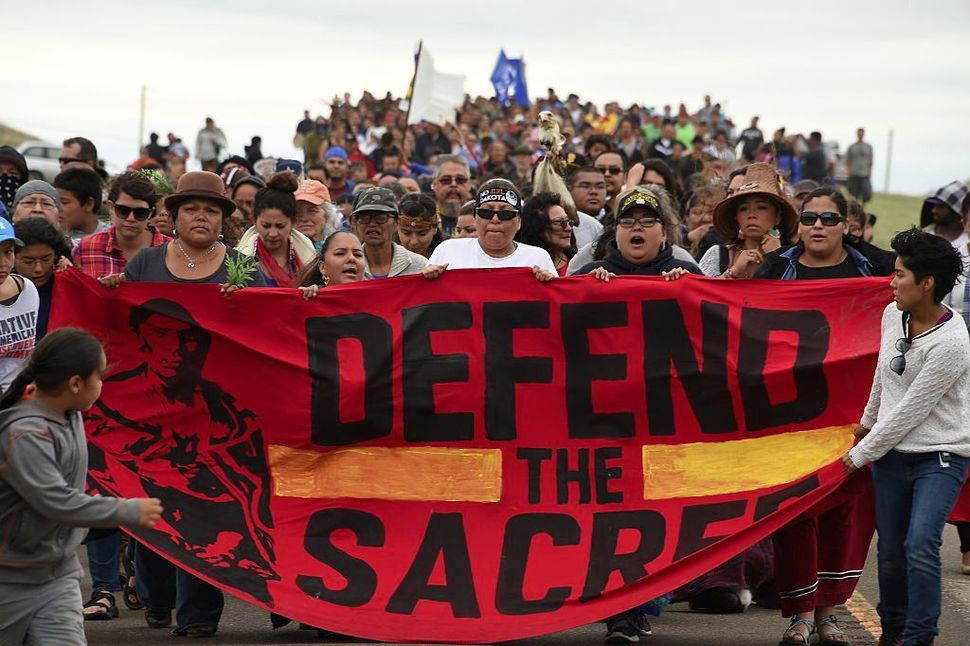Donald Trump is on The Warpath to Standing Rock, and Jews Must Battle Him

Image by Robyn Beck
Four days into his presidency, Trump signed an executive order to advance construction of the controversial Dakota Access Pipeline, despite the fact that The Army Corps of Engineers, which manages the land the pipeline would be built on, denied an easement to the multi-billion dollar gas and propane company behind the project. The Army Corps of Engineers found in December that Energy Transfer Partners (ETP) failed to fully consider the project’s environmental impact, a decision that only came after extensive, widely covered protests by the Standing Rock Sioux Tribe and their allies.
Trump signed the executive order, even though concerns had been raised over his extensive personal investment in ETP. Though he claims to have sold his shares, it is possible that he still maintains holdings in Philips 66, another company that will have a stake in the pipeline if it is built. Trump’s presidential campaign also received more than $100,000 in funding from Kelcy Warren, CEO of ETP. And the president’s pick for Energy Secretary, former Texas governor Rick Perry, served an ETP board member up until January 5th. Trump’s financial ties to companies profiting from the pipeline raises serious questions about conflicts of interest.
The Standing Rock Sioux Tribe, whose land and water could be harmed by the construction of the pipeline, have been fighting the plan to build on the intended route for nearly a year — part of its centuries-long struggle against exploitation of its resources. Since April of 2016, members of the Standing Rock Sioux and a number of other tribes from across the country have protested the proposed pipeline, calling themselves Water Protectors. Thousands of supporters have also traveled to Cannon Ball, North Dakota, where the protest is based, to stand in solidarity with the Water Protectors.
A small but growing number of Jewish activists have supported the tribe and joined protests in a variety of ways, including standing shoulder to shoulder on the barricades in North Dakota, marching in protest of the pipeline in cities across the country, expressing support through official statements, fundraising for protest camp supplies and legal fees, and developing Jewish prayers, rituals, and fast days in spiritual support for the Water Protectors’ cause.
“It is essential that we as a people of conscience, as American Jews, continue to support the Indigenous Sovereignty Movement in this country, and follow the lead of the indigenous leaders at Standing Rock,” declared Rabbi Ari Lev Fornari, of Kol Tzedek in Philadelphia and an organizer for the Water Protectors. “This is a struggle that highlights the transformative power of non-violent civil disobedience and strong Indigenous leadership.”
Following Trump’s Executive Order, the Water Protectors and its Jewish allies vow to ramp up the fight. T’ruah has re-affirmed its goal of organizing rabbis nationwide to stand in physical solidarity with the Water Protectors, to help support them with supplies and funds, and to raise awareness about their cause, and the , the Reconstructionist Rabbinical Association and the Shalom Center (including 672 co-signing Rabbis) have made strong statements of commitment, among others.
Rabbi John Jay Tilsen, Rabbi of Congregation Beth El-Keser in New Haven, Connecticut, cites a commitment to justice when he speaks of his support for the Water Protectors. “My approach to Jewish life and Jewish thought has to do with rule of law and covenant,” he said. “Law can be a tool for justice and for peace, but it is just as often used by the powerful to oppress. The theory of Jewish civilization is that law can and must be a tool for justice.”
The imperative of Tikkun Olam — that central tenet of our religion that requires us to heal the world — obliges Jews to loudly advocate for the rights of a people to protect their sovereignty, their sacred spaces, and the very water that keeps them alive. T’ruah, in its statementsupporting the protests, also urged Jews to remember that throughout history, our cemeteries have also been desecrated and destroyed, and to recognize that we cannot stand idly by while the same thing happens to another people — especially not for the sake of greed.
Since President Trump’s declaration that he will continue pursuing corporate profit over indigenous rights, it is imperative that Jews continue to battle him on the ground. While there is plenty to protest these days, given the daily barrage of damaging executive orders from the Trump administration, it can be difficult to focus on any one cause. Perhaps, Trump counted on national distraction when timing the release of his order to green light the Pipeline. In any case, Jewish activists have an obligation not to let people — or themselves — lose sight of Standing Rock, and to work against letting this vital cause become, as some regrettably do, lost because of the fickle attention span of the American public.
Lana Adler is the Forward Opinion Fellow. Follow her on Twitter @Lana_Macondo.
A message from our Publisher & CEO Rachel Fishman Feddersen

I hope you appreciated this article. Before you go, I’d like to ask you to please support the Forward’s award-winning, nonprofit journalism so that we can be prepared for whatever news 2025 brings.
At a time when other newsrooms are closing or cutting back, the Forward has removed its paywall and invested additional resources to report on the ground from Israel and around the U.S. on the impact of the war, rising antisemitism and polarized discourse.
Readers like you make it all possible. Support our work by becoming a Forward Member and connect with our journalism and your community.
— Rachel Fishman Feddersen, Publisher and CEO





























